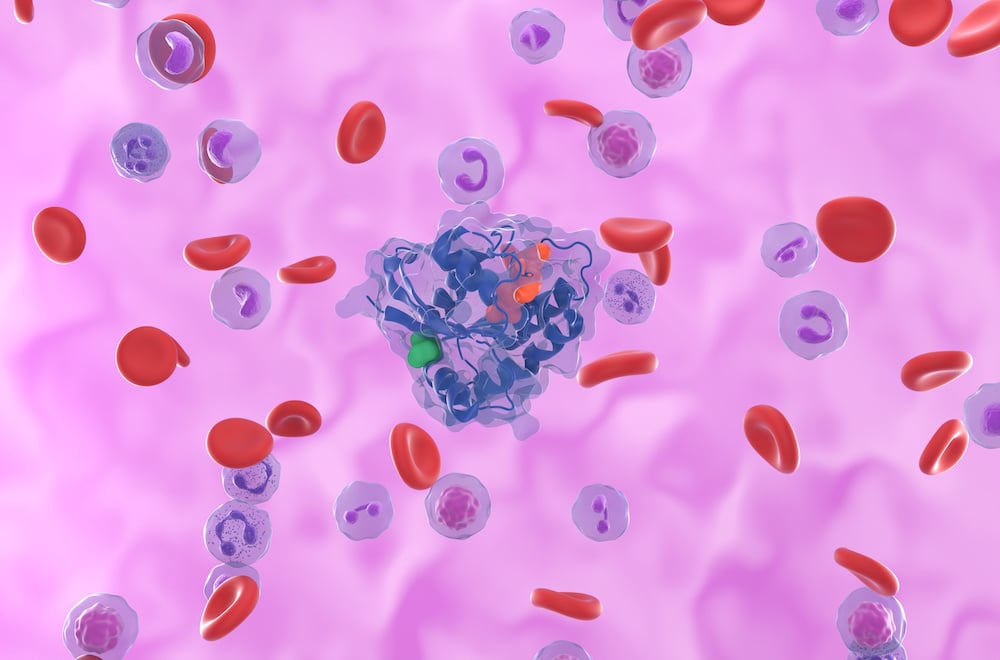Lung Cancer Gene Mutations: What Are They and How Do They Affect Treatment?
5 min read

Lung cancer is not typically an inherited condition. For nearly all patients, lung cancer is caused by long-term exposure to smoke, radon, or other chemicals in their environment. This exposure leads to mutations in the body’s genes that control cell growth. Tumors then begin to develop from the overgrowth of cells.
While the medical field has understood the genetic mutation process for some time, it’s only in the past several years that drug therapies were developed to treat lung cancer patients with specific gene mutations. Currently, these therapies are only available for non-small cell lung cancer patients. However, that accounts for about 85% of all lung cancer cases.
What are Gene Mutations?
Genes contain instructions (DNA) that tell your cells how to function and which proteins to produce. Proteins control how quickly cells grow, divide, and how long they’ll survive. A change in a specific gene called a mutation, alters the cell’s normal activity.
Gene mutations are permanent changes in your cells’ DNA which carry the genetic information for each cells’ development, growth, and ability to reproduce.
When DNA is damaged by a mutation, it can’t repair itself, causing cells to grow uncontrollably or live too long. If left untreated, gene mutations can lead to cancer. This is true for many types of cancer, including lung.
What Causes Lung Cancer Gene Mutations?
Most gene mutations that lead to lung cancer develop in the patient’s lifetime. This is called a somatic mutation. Acquired mutations can be caused by tobacco smoke, air pollution, chemicals, naturally occurring radon gas, the sun’s ultraviolet radiation, or viruses. DNA can also change for no apparent reason or due to an unknown cause.
Read more in our blog about the causes of lung cancer.
Which Genes Mutate to Develop Lung Cancer?
Non-small cell lung cancer patients are usually tested when they receive a diagnosis to see if specific genes have mutated. It’s common to find a mutation in the TP53, EGFR, and KRAS genes in lung cancer.
- The TP53 gene is responsible for producing a protein that controls cell growth and division by monitoring DNA damage. When DNA becomes damaged, this protein helps the cell determine whether it can be repaired or if the cell needs to self-destruct. This mutation is found in about half of non-small cell lung cancer patients.
- KRAS, which normally helps cells grow and divide, comprises 25% of lung cancer gene mutations. It’s more common in smokers and patients with adenocarcinoma.
- EGFR (epidermal growth factor receptor) helps cells grow and divide. Causing up to 30% of gene mutations, it’s more common in nonsmokers, women, and adenocarcinoma patients.
- FGFR1 mutations make up from 9% to 20% of mutations. FGFR1 affects how cells grow and spread. The mutation is more common in smokers with squamous cell cancer.
- ALK (anaplastic lymphoma kinase) causes from 3% to 7% of mutations. ALK mutations result when two genes grow together to create a new gene. It’s more common in non-smokers, younger men in their 50s, and those who have adenocarcinoma.
- MET is up to 5% of mutations. It occurs when your body makes too many copies of the MET gene, causing cells to live too long and spread. This is an aggressive cancer, and more common in squamous or adenocarcinoma patients.
- BRAF is up to 3% of mutations, most commonly in women, smokers, or those who have adenocarcinoma.
The testing is simple and will give your lung cancer specialist important information about which treatments are most likely to work best for you.
How are Gene Mutations Diagnosed?
Your oncologist will test your tumor to determine if you have a lung cancer gene mutation, also called genomic or biomarker testing.
Testing requires a sample of lung cancer tissue and/or blood sample. If the tissue will be sampled, it may be done after surgery is performed to remove the tumor. However, not every lung cancer patient is a candidate for surgery. There are other ways to get a sample of the tumor including a bronchoscopy, which uses a flexible tube through your nose or mouth into your lungs to extract tissue and a biopsy which usually uses a needle to remove a small tissue sample.
Once the sample is collected, one or more of these tests will be performed to identify which, if any, gene mutations are present.
- Sequencing – an early test for mutations that assesses the entire gene for mutations – is not as sensitive as the methods described below.
- Allele-specific testing can identify many genes, including EGFR, MET, BRAF, HER2, and KRAS. It’s faster, less expensive, and more accurate than sequencing.
- Next-generation sequencing (NGS) uses computers to identify even more mutations using blood or tissue samples.
- Fluorescence in-situ testing (FISH) can identify ALK, ROS1, RET and other mutations.
- Immunohistochemistry (IHC) is faster and less expensive than FISH and can identify ALK and ROS1.
- Liquid biopsies use blood samples to measure tumor cells’ DNA. It can quickly identify EGFR mutations.
How Do I Get the Most Effective Lung Cancer Treatment?
The most effective treatments for NSCLC are individualized to target the specific gene mutation that caused NSCLC. Standard lung treatment used to be the same for every patient and usually included chemotherapy. Development continues on newer, faster, and more accurate testing methods targeted at specific mutations.
Once your oncologist has confirmed a gene mutation, he/she can determine if there is a targeted therapy drug that will work to counteract the gene mutation. Not all gene mutations are treatable with targeted therapy, however there are additional therapies used including chemotherapy and radiation therapy.
How Does Targeted Therapy Work?
Targeted therapy drugs attach to specific targets on cancer cells and kill the cells by making them self-destruct or stop growing. Some drugs enter the cells and stop them from dividing and spreading.
Treatment with targeted gene therapy has fewer side effects compared to other treatments. It targets only the cancer cells, leaving healthy cells unaffected.
Targeted therapies designed to stop gene mutations have made a profound improvement in NSCLC patients’ lives. Progression-free survival of patients given targeted therapy is much longer, compared to chemotherapy.
Read more in our blog on advancements in lung cancer treatments.
Some lung cancer patients will develop a resistance to targeted therapy drugs over time. Some of the newest research is focusing on reducing cells’ resistance to drugs. Research continues on immunotherapies and targeted therapy for advanced cancer. Immune checkpoint inhibitors research is one of the newest therapies. It’s designed to boost the body’s own immune system to fight cancer.
These therapies and many more in the pipeline are the result of clinical research trials. Lung cancer patients, including those at Rocky Mountain Cancer Centers, participate in the trials, giving them access to these promising therapies before they are available to all patients with the same diagnosis.
Talk to your oncologist to see if a clinical trial is available, especially for any genetic mutations that may have been identified.
Providing Patients in Colorado With the Most Up-to-Date Lung Cancer Treatments
The development of more targeted therapy drugs to fight different gene mutations in lung cancer patients gives patients hope that was never possible before. At Rocky Mountain Cancer Centers, we create a personalized treatment plan using targeted therapies and other treatments including clinical trials.
If you or a loved one was diagnosed with lung cancer, whether for the first time or if it has come back, schedule a consultation with one of our lung cancer doctors in Colorado including the Denver area, Colorado Springs, Boulder, and throughout the Front Range.

